Peter MALONE
Saturday, 18 September 2021 19:25
Run Rebecca Run

RUN REBECCA RUN
Australia, 1981, 90 minutes, Colour.
Simone Buchanan, Aileen Britton, Henry Szeps.
Directed by Peter Maxwell.
Run Rebecca Run is one of several films made by Independent Productions (producer Brendon Lunney) for family and, especially, children's audiences. This and several others (Platypus Cove, Flute Man) were written by Charles Stamp and most of the series directed by Peter Maxwell (The Highest Honour, Touch and Go).
The films have child stars, especially Simone Buchanan, in the central roles. Aileen Britton and Henry Szeps feature prominently in most of the films. Their stories are quite straightforward: the presentation of the characters and their situations, an adventure (reminiscent of old-time popular stories with their dangers and heroism) and the upstaging of the villains. This film has a particularly moralising ending as Rebecca actually goes to Parliament to plead the cause of an illegal migrant who has escaped from a South American dictatorship. (The films are fairly strong in their criticism of social injustice in the broad Australian community.)
Entertaining material for the intended audience.
1. An enjoyable film? For children? Adults? The story and characters designed for younger audiences and their interest and entertainment? The moralising ending?
2. The brief running time? Colour, music, the use of Sydney locations? Audiences identifying with the characters and the situations?
3. Title - expectations and fulfilment? The focus on Rebecca? Danger?
4. The use Sydney, suburbs, national park, the scenery, the river, the island? Their being well worked into the plot?
5. The presentation of Rebecca and her family: her home, parents, their work, pleasant, friends, the scouts, the competition, her taking photos, bikes? The importance of the character of her parrot, Fancy? (And Ross Higgins' comic voice?) Rebecca as knowing her own mind, decisive, resourceful, sharp-tongued? The experience that she underwent, saving herself, saving Manuel?
6. Rebecca on the river, becoming lost? Her parents' concern and the way this was portrayed? The police, the patrol, her cousin Andrew-and the helicopter? The effort and the expense to find Rebecca?
7. The island and Manuel's presence there? Henry Szeps' style - a persuasive South American migrant? His South American story, deserting the ship, hiding on the island, coping, food? The discovery of Rebecca? Holding her? Her attempts to escape and his foiling these attempts? Chases, the batteries, tying her up, the radio?
8. Her swimming and Manuel saving her? The snake? The bond growing between the two after the antagonism? Eating, sharing, songs and the guitar? Parrot? Rod, breaking the leg? The interaction between the two - especially Rebecca's sharp tongue?
9. The points made about South American migrants: governments, freedom? The contrast with Australia? Rebecca's harsh but generous attitudes? Her mellowing? Learning? Questions of language, culture? The appeal to Australian fairness?
10. The police? Their not telling? The Minister for Immigration? The presentation to Parliament? The credibility of Rebecca's speech and her plea?
11. The background of Parliament, the Speaker, the parliamentarians, the critics. the minister? The attitude towards immigration policy? Difficulties and resolution? The happy ending?
12. Themes of Australian life and style, the suburbs? Australian children, adults? Social issues? Australians trying to be honourable? An entertaining film - and Rebecca as a persuasive heroine?
Published in Movie Reviews
Published in
Movie Reviews
Tagged under
Saturday, 18 September 2021 19:25
Running on Empty/ 1983
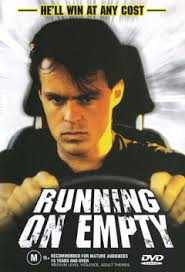
RUNNING ON EMPTY
Australia, 1983, 83 minutes, Colour.
Terry Serio, Deborah Conway, Max Cullen, Richard Moir, Chris Haywood, Penne Hackforth-Jones?.
Directed by John Clark.
Running on Empty is one of the many films of 1981-82 that took advantage of Australian government tax incentives for producing films quickly. It is in the vein of the American road movie, the popular feature for young audiences at drive-ins. It is certainly very well made technically and has excellent special effects and stunt work. The plot and screenplay are a mixture of exploitive material, material aimed directly at the youth market (dashes of sex scenes, violence, language and adolescent confrontations) and some reflective material on current issues. The screenplay also has a nostalgia about cars (perhaps they'll become obsolete in the near future). Max Cullen very effectively portrays a character who is a remnant of the James Dean, Rebel Without a Cause, days of the mid-'50s. He is an image of what the hero of this film might be like in decades to come. With these strands the film does have something to say as well as something to show.
Terry Serio and Deborah Conway have strong screen personality which enhances the impact of the film. A number of prominent Australian actors and actresses are in the cast, especially Max Cullen and Anne Semmler. Richard Moir, quite in contrast to his roles in such films as Heatwave, is a particularly obnoxious villain. While the film was sponsored by the Western Australian Film Corporation, with some location photography in the west, the setting is Sydney.
1. An entertaining film? The audience aimed at: age, local audience, overseas?
2. Production values: use of 5Testern Australian locations, Sydney? The atmosphere of the contemporary Australian city, countryside? An authentic atmosphere for the people, the events? Panavision, colour? The focus on cars, machinery, technology? Special effects and stunts? The atmospheric musical score? The title song and its lyrics - significance?
3. The title and the reference to cars? The challenge of cars, danger, youth, competitiveness, life and death?
4. The title and themes: the love of cars, machinery, knowledge of engines, the make of cars, their power? Racing and speed? Youth doing something with their lives to drive cars, exercise control, and a possibility of freedom? The focus on experience for the driver? The self-preoccupation and disregard of others? The possibility of heroics in driving? Admiration? Competitiveness, bets, defying even to death? The film's use of the symbolism of the car: contemporary technology, the vehicle of the modern age, power, speed, the feel of driving the car? The car as an extension of its driver? The writings on the car as masculine symbol for aggression, drive, personality, sexuality? Did the film use this symbolism much?
5. The opening and the initial race, its atmosphere, the youth cheering their heroes on, the speed of the race, the roads, the dangers, accidents? The hostility of the drivers? The competitive atmosphere and desperation? The accident? Death? The onlookers, the running from the accident, the police? Fox and his winning, his callous attitude towards the dead opponent, his pride in winning? The recapitulation of this opening at the end with the clash with Mike? Fox driving to his death? The comments made about not wanting to come second - even preferring death?
6. The initial focus on Fox: an exaggerated villain? Realistic? The stereotypes of his character? The callous attitudes, leadership. his presence at the special bar. his entourage. the deaf henchman, his dominance in the group, wanting to be top, pursuing mike and Julie in the countryside, his relationship with Julie, the callous attitude towards Mike and the cutting of his jeans and standing on him? The challenge to race? The initial win? The clash and Fox's pride being hurt? His being unsatisfied? The bashing of Tony? The build-up to the final challenge? Fox pressurised by the corrupt police? Fox's losing the race, staring at Mike, driving intensely at him, killing himself? The symbolising of the death wish of the intense driver?
7. The contrast with Mike as hero? The ordinary young Australian man? His involvement with cars, at work, knowledge of machinery, skill with machines? His attachment to Julie? The magazine in the store? His watching the lifesavers and the photography? His bond with Tony ~ friendship, working with him? Belonging to the group around the bar? The interlude with his father and the ineffectiveness of his father? His seeming to have his feet on the ground more than his father? The lack of ties, employment? The ability to race and go to the bush? His pursuit of Julie? Discussions? The sexual relationship? The love for her - and the ironic comment about asking of she still respected him (reversal of sex roles and language in the contemporary world?) - the continued rivalry with Fox? The going to the country to make money to race? The initial race with Fox and the crashing into the semi-trailer?
8. Mike and his skill with cars, love of the road, the drive to Wollongong and his being bashed by Fox's car? The challenge and his races in the countryside, being hemmed in by the hostile vehicles, the car in flames, the escape, the going into the river? The encounter with Rev - meeting him, the driving in the dark at night, his garage? His becoming friends with Rev? Julie and Tony at home with Rev and his wife? The talking. the memories of the 150s? The days of 'chicken' races and daredevil driving - with disastrous results for life. blindness? The working with Rev to reconstruct the car? The idyllic time in the country? The return to confront Fox? The build-up to the first race, the crash into the serni-trailer? Mike in hospital. the tension with Tony and his being bashed, the tension with Julie and her going out, his hurting her and bruising her? His decision to plead with Rev for his car? His being seen as Revs surrogate son? The return to the race? His beating Fox? His standing defiantly on the road, Fox's driving at him, his response to Fox's death? The final image of his looking from the screen?
9. Julie as ordinary heroine? Her background, family? Her involvement with the group at the bar, with Fox? The drive with Mike and her being taken by Fox and running away? The invitation to mike for relationship, sexual liaison? Her accompanying Tony and Mike to the country, sharing their experiences, the dangers, enjoying the time with Rev and his wife? Her going out when Mike was convalescing? Their clash and his hurting her? The reconciliation and her saying 'We did it" about the bruises? The ending?
10. Tony and his background, ethnic themes, prejudices of Fox's group? His skill with his work, close friendship with Tony, sharing the experience of the races and building the car with Rev? His visit to the hospital and his jealousy of Julie? His being bashed? His contribution at the end? The theme of the bonds of Australian mateship and masculine friendship?
11. The character of Rev: his manner, American style language, dress? Driving and the discovery that he was blind? His knowledge of cars', his driving on the strip in the bush. continuing the risks of the past? A relic of the old days, the value of his memories? His love for his wife and her sharing things? His skill with cars. using his ears? The friendship with the group? The rapport with Mike? The reconstruction of the car? Mike's return and pleading for the use of his car? His hesitation, Mike as his son? Mike winning on his behalf? The parallel between the older Rev and the younger Mike?
12. The various types in the groups - Vic and his friendship and building his car in style? Fox’s entourage - the big deaf man, his brutality, his being put in the toilet by the police? The various friends who checked on the radio? The staged chase through the lumberyard to divert the police? The atmosphere of the bar? Cars, belonging to peer group? Attitudes? How accurate this picture of a sub-culture in the cities?
13. The picture of the police - initially comic, madcap chases, exaggerated attitudes? Their becoming sinister with the pressure on Fox and their exercise of violence in the club? Their sharing Fox's failure?
14. incidental characters - the comment made in portraying Mike's father, the races in the countryside and their brutality, the lifesavers and the photographer?
15. A blend of action, cars, mirroring of the times, sensation and exploitation, themes of youth?
Published in Movie Reviews
Published in
Movie Reviews
Tagged under
Saturday, 18 September 2021 19:25
Rooted
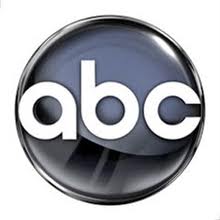
ROOTED
Australia, 1985, 90 minutes, Colour.
James Laurie, Genevieve Mooy, Terry Serio, Peter Mochrie.
Directed by Ron Way.
Rooted is one of a series of telemovies sponsored by the Australian Broadcasting Corporation in 1985. The screenplay is by playwright Alex Buzo, adapting his successful stage comedy.
The film is a black comedy, commenting on a younger to middle age generation, their memories of their past, their moral stances and values, their adapting to growing older. There is a great deal of irony in the presentation of situations and characters. The film is very well served by its cast. James Laurie is excellent as the naive and good-natured Bentley. Genevieve Mooy (AFI nomination for her clever impersonation of an executive in Emoh Ruo). Star of the '60s, Little Pattie, makes a guest appearance. The film creates the atmosphere of Sydney - but always with the ironic touch. This film might be compared with Esben Storm's Stanley which covers some of the same ground but was not well received by critics. The film is directed by Ron Way who has extensive experience in television.
1. A black comedy, contemporary, urban? The uncertainties of the times? The future? The Australian flavour of this black slice of life?
2. The telemovie and its style? For home audiences? The colour photography of Sydney, Manly, the harbour? Socials? Dances? Cars? The music of the '60s - the wide range of songs, the background, the era of the Beatles?
3. Alex Buzo's adapting of his play to the screen: the opening out, locations and environment, delineation of characters, comic interactions, speeches?
4. The significance of the title: rooted, uprooted, disjointed? The irony? The language - an alternate title, with memories of Samuel Beckett, Waiting for Simmo?
5. The focus on Bentley: the Australian young Everyman? Pleasant, able - yet not able? His image of himself and reality? Seeing him as a man, his memories of schooldays? The friends from school and their set? Sandy and his relationship to her, breakfast in bed, the driving, the competitiveness with Gary, the Stomp, the search for her, her leaving him? The opening sequences and his swimming, running and jogging, friendliness - a man on the go? His quickly being put on the defensive? His self-image as vigorous - and the reality? The competitiveness with the driving and its effect? The encounter with Little Pattie? Yet his going downhill? His work, problems - and his boss saying that he could solve all problems? Gary and his friendship, staying with him? Richard and his arrival and interest? Davo as his slob friend? Sludge and his comments on the ferry about divorce and tarts? His memories of Hammo (and the irony of the tramp often glimpsed turning out to be Hammo - and the irony of his death)? The effect on his background, goals, experience and friends - at home, being spurned by Sandy, accused of being a voyeur, ousted from him home, going to board, resigning from his work, coming and finding even his room gone? Feeling the victim of a conspiracy? The continual presence off screen of Simmo - his influence in their lives at school, with Sandy, with Gary and his job, Richard and Diana? Simmo taking over his life? The significance of his final gaze at the audience? Bentley as a character? Everyman character? The Australian male: school. Public Service. friends and mates, marriage, marriage break-up? The weakness of the Australian male? His potential?
6. The ever-presence of Simmo - and the fact that he was never seen? His car and the number plate, the memories of what he was like at school, his dominance, his wealth, his winning - but being defied by Hammo? His taking people's wives - yet the affairs not lasting long? Sandy and her infatuation, carrying on the affair in the house? Diane and her self-assurance? Bentley's friends wanting jobs from Simmo? The final irony of everybody joining in the party for him and ousting Bentley? His controlling all of them? Why did Bentley not defy him? Simmo as a symbol of dominance?
7. Sandy and her hardness, love for Bentley, falling out of love with him, her bluntness of manner, enjoying the drag race, leaving at the dance, exaggerating her despising of Bentley, her black comments, the affair with Simmo the cigarettes, the visit of Diane and Richard? Her being part of the party at the end?
8. Diane and her visit with Richard. her arty style, talk. relationships with men, with Bentley's friends, being Simmo's girl, her malice?
9. Cary and Richard as Bentley's friends, the memories from school, Gary and the girls. his mother. the boarding room? Richard and his art, the underground paper? Their liaisons with Diane? Gary and his allowing people to board? Getting rid of them? Their both wanting jobs from Simmo? Preparing the party?
10. Davo as the glimpse of the Australian slob? Sludge and his broken marriage, his advice to Bentley - and the ironic
comments about marriage break-ups and tarts?
11. Hammo and the tramp that was often glimpsed, his having stood up to Simmo. the news of his death?
12. Alan White and the Public Service, his confidence in Bentley. his being all talk. his arriving for Simmo's party?
13. The glimpse of characters throughout the film - at the Stomp, Little Pattie,, the girls and the dating, people on the ferry, the friendly neighbour, the party and the gatecrashers who were ousted?
14. The glimpse of Australian men and women? Education, careers, art, affluence?
15. Themes of Australian values and morals? Relationships? Fickleness and authenticity?
Published in Movie Reviews
Published in
Movie Reviews
Tagged under
Saturday, 18 September 2021 19:25
Ride a Wild Pony
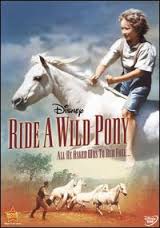
RIDE A WILD PONY
US, 1976, 91 minutes, Colour.
Robert Bettles, Eva Griffith, Michael Craig, John Meillon.
Directed by Don Chaffey.
Ride a Wild Pony and Born to Run are two Walt Disney films produced in Australia. The director of each was Don Chaffey, who made The Fourth Wish and also made Pete's Dragon for Disney. Both films are about horses and ponies and appeal to younger audiences entertained by animal stories. They both star Robert Bettles, who also appeared in The Fourth Wish. Bettles is at times an abrasive young boy not the ordinary endearing Hollywood hero of Disney films. Ride a Wild Pony was filmed in Chiltern, Victoria and Born to Win around the Newcastle area. They both are period films and portray the Australian countryside and the period very attractively. Animal story, children, animals, striving to achieve are part of the ingredients which ensure success.
1. For what audience was this film made? Audience expectations of an action film centering on a pony? How well were expectations fulfilled?
2. The importance of the 1920's setting? The picturing of the farms, the wealthy property, the town and life in the town, the people and their way of life?
3. The importance of the Australian setting for background and themes? Australian characters? Australian settings and colour?
4. How attractive a boy was Scott? Picturing him as a migrant, the hard farm life, his hard-working mother and father? His skipping school and the need for school? His response to the pony and the training of the pony? The loss of the pony? His relationship with the children at school, especially the Quayles? Why did he have a chip on his shoulder? The length of time that he stayed away from school? People searching for him? The focus of his life in the pony?
5. How important for understanding Scott was the picture of the Piries? Their grimness, the glum looks of the mother, their migrant and Welsh background, their poverty, the reaction of people in the town, especially the police? The poor appearance of the family?
6. The importance of the contrast with the Ellisons? Their wealthy background, their property, their manners? Their owning the ponies?
7. Josie in the background of the Ellisons? 'Audience pity for her in her illness? The focus of her life in the pony? The detailed picturing of her achievement in training the pony? Yet the severity expression in her love?
8. The picturing of the Quayle family as the ordinary people of the town? Quayle as a fair solicitor, humane, giving every man his due? The relationships in his own family?
9. How interesting was the wrangle? The bitterness, the hurt for the children and each family? The humour of the situation? The court-case and the evidence and the way of deciding whose horse the pony was? The people betting? The impact of the final decision?
10. How valuable were the minor characters and their presentation? The situations in the town, the training of the pony, the shops, the people betting etc.?
11. How moving was the reconciliation and the apology? What did this say about the families, about the children?
12. The themes of Australia: the rich and the poor, country and city, class distinctions? Themes of pity, arrogance, friendship and love?
13. How enjoyable was the film? How much could be learnt of human values through it?
Published in Movie Reviews
Published in
Movie Reviews
Tagged under
Saturday, 18 September 2021 19:25
Rhapsody
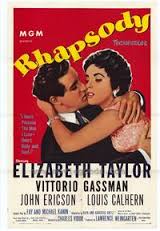
RHAPSODY
US, 1954, 116 minutes, Colour.
Elizabeth Taylor, Vittorio Gassman, John Ericson, Louis Calhern, Michael Chekhov, Barbara Bates.
Directed by Charles Vidor.
A glossy, colourful Elizabeth Taylor vehicle of the early '50s. Her two leading men, John Ericson and Vittorio Gassman, had varied careers although Gassman emerged as a very solid and successful actor in the '70s. The film is an adaptation (extensive) and updating of Henry Handel Richardson's 'Morris Guest'. Even some of the names of the characters have been changed and the plot adapted to a post-war situation. However, many of the central elements of the world of music training and romantic obsessions remain. There are some excellent musical interludes including violin concertos by Tchaikovsky and Rachmaninoff The leading actors give very good impressions of violin and piano playing. The film was obviously made in Hollywood and uses rear projection considerably, although there are some attractive outdoor sequences without the stars. Henry Handel Richardson's work has been filmed with The Getting of Wisdom and television adaptations of her classic, The Fortunes of Richard Mahony. A curiosity item for those interested in cinema adaptations of the work of this author. Charles Vidor, the director, made the biographies of Chopin - A Song To Remember, and Liszt - Song Without End.
1. An enjoyable and attractive soap opera? M.G.M. production style of the '50s? Plush decor and costumes, the atmosphere of affluence? An Elizabeth Taylor vehicle? Classical music film? Love story?
2. The blend of location and studio work? The use of European settings, decor, wardrobe?
3. The basis of the film in the work of Henry Handel Richardson? Adaptation, updating? A satisfactory adaptation?
4. The presentation of the classical score, the violin concertos, their insertion into the plot, their presentation?
5. The film's focus on Louise? Elizabeth Taylor's personality and style? The spoilt daughter, her reaction to her father's dinner plans, her plans for marrying Paul? Her relationship with Paul and following him to Zurich? The establishing of the apartment, being with him at the tavern and being isolated by his violin playing and his friends? The encounter with James Guest? The audition and her joy for guest, her own failure and the advice of the examiner? Her taking Paul to see her father? Distracting him from his work and success, waiting three weeks without seeing him, her being spurned after his success? What did she want, why? How selfish and presumptuous? How attractive a woman?
6. Paul and his love for Louise, his love for his music and violin playing, his skill? The indications of his devotion to his career, the visit to Louise's father? The failure and outburst at the rehearsal and his apologising? The intensity of his three weeks practice, the success at the concert? His decisions about his future, leaving Louise, leaving in the middle of the night with Effie? Rome and his success, the collage of his world tour?
7. The contrast with James Guest? American background, the war? His love for the piano? His infatuation with Louse? Playing her piano at night, making a pass at her? Helping her in her suicide attempt?
8. Louise's father and his strong attitudes, his attitudes towards his daughter, his dislike of Paul? His coming to his daughter's help with her attempted suicide? His acceptance of Guest? His finding out more about Paul? His plans for reuniting Louise with him? A portrait of an interfering and successful businessman?
9. Louise's decision to marry Guest, the effect on him and his drinking? The encounter with Paul and the revelation of the truth? Louise's presence with Guest during his training, her happiness at his success? Telling him the truth immediately before his recital? His having to play the recital by himself? His looking at her empty seat? His ultimate success and the vindication of her hopes?
10. Louise's decision to leave with Paul, Paul's arrival during the recital? Guest's success and disappointment with Louise’s absence? Discovering her on the empty stage and the basis for the future?
11. The portrait of the student group in Zurich, the tutors and the conductors, the world of professional music?
12. How entertaining a soap opera, the basic ingredients of careers and success, love and romance. marriage, failure? How much insight into relationships?
Published in Movie Reviews
Published in
Movie Reviews
Tagged under
Saturday, 18 September 2021 19:25
Return of Captain Invincible, The
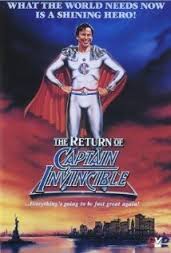
THE RETURN OF CAPTAIN INVINCIBLE
Australia, 1982, 91 minutes, Colour.
Alan Arkin, Christopher Lee, Kate Fitzpatrick, Bill Hunter, Michael Pate, John Bluthal, Arthur Dignam, Hayes Gordon, Chris Haywood, Max Cullen, Graham Kennedy, Gus Mercurio, Noel Ferrier.
Directed by Philippe Mora.
The Return of Captain Invincible was grandiose in design - but had an almost disastrous history.
The film was produced by Seven Keys distributor and entrepreneur. Andrew Gaty (who co-wrote the script). Direction was by Philippe Mora, Brother Can you Spare a Dime, Swastika, Mad Dog Morgan, The Beast Within (in the U.S.). The film was produced in Sydney with a big budget, special effects and a star Australian cast with Alan Arkin and Christopher Lee in the leads. The film was shown at the A.F.I. Awards in 1982 as an Australian production. The film was subsequently
re-cut by Gaty for American distribution. There were court cases about the re-cut film's status as an Australian production. Eventually an 86-minute version (from a version of over 100 minutes) was distributed very briefly in Melbourne in 1983, with great fanfare in Sydney in the middle of 1983, even with Christopher Lee coming to Australia for Sydney's Captain Invincible Day. However, the film was not widely seen.
There are many excellent technical aspects of the film including the colour photography, the use of Blue Mountains and Sydney locations, lavish sets. There are songs by the Rocky Horror team of Richard Hartley and Richard O'Brien - and choreography reminiscent of Rocky Horror and Shock Treatment. Much of it is humorous and ironic and very much tongue-in-cheek. There are a lot of special effects with Captain Invincible as a poor man's Superman.
The film presents, with some documentary collage - a speciality of Philippe Mora's documentaries - the state of western society in the '30s and '40s and the heroics of Captain Invincible. He is much like many of the heroes of the serials. He is then found to be an alcoholic, down and out in the Blue Mountains. He wanders the streets of Sydney and is requested to come back to action. He is assisted by a policewoman, played strongly by Kate Fitzpatrick. Alan Arkin seems to enjoy himself in the central role, especially when confronting the arch villain Mr. Midnight, played with his suave Dracula style by Christopher Lee. There is a range of oddball characters played by a strong Australian cast. There are also satiric touches on American and Australian politics with Graham Kennedy, Michael Pate, Max Phipps, Noel Ferrier and others leading the songs and dances.
The film aims to be in the same vein as Superman, though the parody and spoof is more in evidence. There are the mythical comic strip heroics, the critical state of society, the confrontation of good and evil. The film works sufficiently entertainingly at a matinee level - but it seemed to intend more than this.
Published in Movie Reviews
Published in
Movie Reviews
Tagged under
Saturday, 18 September 2021 19:25
Raw Deal/ 1977
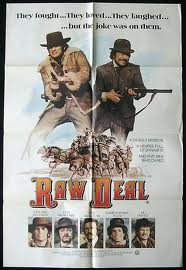
RAW DEAL
Australia, 1977, 94 minutes., Colour.
Gerard Kennedy, Gus Mercurio, Rod Mullinar, Chris Pate, Michael Carman.
Directed by Russell Hagg.
Raw Deal is a title both for stars and audience. Stars go through standard Western routines, chases, shoot-ups and repartee. Audiences wonder whether this conventional actioner (enjoyable enough at the time as such standard fare is what Australians need make. "Spaghetti Westerns" make way for the "meat pie Western" (and the sauce is not forgotten). Derivative films are quite all right in their way - influenced by, illustrating and perhaps adding to a genre. Mere copies are not creative; they ape something else and that's it. This is why this film is a "raw deal". Set in the 19th century and in unlocatable places, the film sounds and looks like average ranch-night fodder.
1. This film as an Australian Western? As an Australian adventure. how authentic? The significance of the title, the treatment of the plot, musical background.. action music and the song?
2. How much did the film derive from American conventions? How creative was it within these conventions? How much did it merely imitate or ape?
3. The background of time and nineteenth century revolution, no revolution in Australia? The clarity or the vagueness of time? The locations,, towns and deserts,, the vagueness of situation? The clarity of the issue in terms of revolution.. bounty hunters, violence Catholic versus Protestant in nineteenth century Australia,, political power?
4. The confrontation and mission structure of the film? Its momentum and suspense. sense of adventure, revenge. violence?
5. The initial impact of the opening,, the confrontation of the Tyrones in the town, the background of their ideology and the leadership of O'Neil? The people in fear? Palmer and Ben liberating the town with their shooting?
6. The introduction of Palmer and Ben in conventional Western style? The travelling salesman, the gunman? Their types, the presentation of their personalities. their reason for joining forces? The relationship between the two?
7. The contrast with Sir Charles and his intrigue? The support of Sir Frederick? The political and religious motivation? Greed? The film's punctuating its adventures with scenes of the two playing chess etc.? The final revelation of their treachery? Deaths?
8. Dick as a comic character? His inexperience and showing-off? Gaol.. acceptance by the group,, the brothel, the mirages? Alex and his background of being a ladies' man? The presentation of the duel and his escape? The Welshman in prison? The conventional backgrounds for establishing a group?
9. The adventure of their journey the relationship between them all. the clashes? The taking of the hearse, the capture of the ammunition? Going across the desert with the hearse?
10. The atmosphere of political injustice,, the siege of the Tyrones, the presentation of O'Neil as a fanatic the capture of the Welshman and his rescue? The shoot-out?
11. The contrast with the elegance of the dance? The humour of the group going in and taking the gentlemen's wives for the dance? The irony of the treachery of Sir Charles and Frederick?
12. The violence of the treachery and the final shoot-out? The inevitability of those who survived?
13. The achievement of this kind of conventional adventure? As an Australian film?
Published in Movie Reviews
Published in
Movie Reviews
Tagged under
Saturday, 18 September 2021 19:25
Race for the Yankee Zephyr
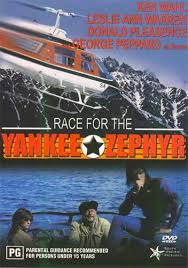
RACE FOR THE YANKEE ZEPHYR
Australia/NZ, 1981, 108 minutes, Colour.
Ken Wahl, Lesley Ann Warren, George Peppard, Donald Pleasence, Bruno Lawrence, Grant Tilly.
Directed by David Hemmings.
Race for the Yankee Zephyr caused some controversy in the Australian film industry in the late '70s. Producer Tony I. Ginnane, who made Patrick, Snapshot, Harlequin, The Survivor amongst other films, wanted to import a number of over
seas stars. Actors' Equity opposed him and he moved the production to New Zealand. The use of New Zealand scenery enhances the film - which is a rather pedestrian chase story with raucous style. It is based on a screenplay by Everett de Roche who wrote a number of enjoyable Australian thrillers including Patrick, The Long Weekend, Road Games. The Australian contribution included photography by Vincent Monton, costumes by Aphrodite Kondos and Brian May's music. Direction is by British actor David Hemmings, who also directed The Survivor. Donald Pleasence has another of his loud roles but George Peppard is a strange villain - a bit like Frank Thring suddenly appearing amid the glaciers with champagne and glasses. Ken Wahl and Lesley Ann Warren are no more than adequate in the central roles - indicating that international names are not necessary for the success of a film.
1. An interesting and enjoyable adventure? Its qualities as action adventure?
2. Australian and New Zealand production values? Location photography, musical score, special effects? International stars? Australasian atmosphere and flavour? International flavour?
3. The opening and the atmosphere of World War Two, American involvement, transport planes? The newsreel effect and enhancing credibility? The crash of the plane, the gold? A popular World War Two story about lost transport and lost treasure?
4. The transition to the present with Gibson and his assistant? Their work in New Zealand, rugged adventure, helicopter work, chasing the deer by helicopter and foot? Outdoor types? Non-New? Zealand types! Their way of life, work, money? An introduction to their skills which were to help them chasing the Yankee Zephyr? The use of locations and their possibilities? The basic situation of being stranded, discovering the plane? Gibson and his attention on the whiskey and missing the gold?
5. New Zealand's South Island beauty and its use for the many chase sequences - by helicopter, car, special vehicles constructed,, horseback and the final speedboat chase?
6. The hero and his preparation for the trek? The encounter with Sally and her reluctance to help with the money? Gibson's discussing the matter with his daughter and her giving in? The detailed preparation for the expedition? The confronting of the criminals? Their being captured? Their escape and the variety of ways in which they reached the plane? The discovery? Gibson and his raucous style and drinking? The tough hero? The resourceful heroine? Their ultimate success?
7. George Peppard as Brown? The criminal fop? His vehicles, clothing, good life out in the open e.g. his wines? His capacity for violence? His criminal advisers and henchmen and their toughness, violence, shooting? Ultimate confrontations? The final chase along the river? The ultimate greed and deaths in the lake? The tough American hero? His action and heroics? How much characterisation? Sally and her presence during the expedition?
8. The impact of special effects. chase photography? The dramatising of the tricks to elude pursuit? The violence?
9. The Yankee Zephyr and its cargo, towing the plane, its going down? The whiskey versus the gold? The irony of saving some of the gold?
10. The happy ending for the goodies and the destruction of the baddies? Saturday matinee adventure and morals?
Published in Movie Reviews
Published in
Movie Reviews
Tagged under
Saturday, 18 September 2021 19:25
Restless Breed, The
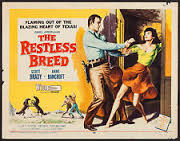
THE RESTLESS BREED
US, 1957, 78 minutes, Colour.
Scott Brady, Anne Bancroft, Jim Davis, Jay C. Flippen, Rhys Williams.
Directed by Alan Dwan.
The Restless Breed is a short conventional western melodrama. A secret agent is killed, his son, a lawyer, is angry and goes to the town to avenge his father against a group of gunfighters who are smuggling arms into Mexico. He meets a mixed-race girl, cared for by a lay preacher. All the ingredients for his being a gunfighter, a man of mystery, saving the town, falling in love with the girl, wreaking revenge on the killers are all there, presented by Alan Dwan, a veteran of 400 films from the silent era into the '60s. Because of the straightforward storytelling, it probably plays better in later decades than some more stylish films of the period.
The other reason for seeing the film is that it features Anne Bancroft at the end of a period where she was a Hollywood starlet from 1952 to 1957, appearing in a great number of support features. However, she moved to Broadway and when she returned to the screen, it was as Annie Sullivan in The Miracle Worker, for which she won an Oscar and then became a celebrated stage and screen actress.
1. The popularity of this kind of western? From the '50s? Brief running time, studio locations?
2. The work of Alan Dwan, his skill as storyteller? The basic ingredients, characters, conventions? Fulfilling audience expectations?
3. The title, the song - and its frequent repetition in melody throughout the film? The songs, Anne Bancroft dancing?
4. The title - reference to whom?
5. The basic situation: Mitch getting the information about the death of his father, the Secret Service and its establishment, undercover work, gun-smuggling on the Mexican border, the assassination? The avenging of the father?
6. The town, Newton dominating it, Cherokee and his henchmen, the shoot-ups in the bar, the deaths of the sheriffs? The confrontation with Mitch, his drawing on them, the deaths? The people looking to him as someone to save them, his being challenged by the set-up in the bar, his going, his evasive tactics, coming in different doors, expectations of the gunfighters? The set-up of the ambush, his seeing it, coming in behind, defeating them, getting the two killers to dance, the Reverend coming in, the shoot-up, his sending them out of town?
7. Mitch as a man of mystery, stolid in manner, attracted to Angelita and trying to kiss her, the Reverend and his suspicions? The encounters with Angelita, talking with her, the revelation of the truth, his talking to her about guns?
8. Angelita, the dancing, adopted, mixed-race, the other children? Her falling in love with Mitch, going to warn him? Learning the truth about him? A future together?
9. Newton, the gunfighter, the assassination? Alan, his listening and spying, his own personal cowardice, his informing Newton? Newton's arrival with Cherokee, the intercut with the preparation for his arrival? In the bar, Cherokee killed, Newton dying?
10. The Reverend, his God-fearing attitudes, justice, looking after the wounded, Cherokee, intervening, humiliated? His care for the children, discovering the truth about Mitch, his friendship with his father?
11. Steve, the marshall, the laying down of the law to Mitch, Mitch not listening, the discussion in the room, Steve's being shot, handing the badge over to Mitch, helping him operate within the law?
12. The American tradition of the lawless west, gunfighters, administration of the law, violence, the gun culture, avenging deaths? The atmosphere of the frontier in the 19th century?
Published in Movie Reviews
Published in
Movie Reviews
Tagged under
Saturday, 18 September 2021 19:25
Red Dragon
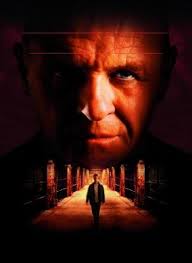
RED DRAGON
US, 2002, 125 minutes, Colour.
Anthony Hopkins, Edward Norton, Harvey Keitel, Ralph Fiennes, Emily Watson, Mary Louise Parker, Anthony Heald, Frank Whaley, Bill Duke, Marybeth Hurt.
Directed by Brett Ratner.
This is a very well crafted detection thriller, written by Ted Tally who won an Oscar for his adaptation of Silence of the Lambs. He obviously understands Hannibal Lecter very intimately and has written another tour-de-force for Anthony Hopkins. Not being a fan of the film Hannibal (where Hopkins did a lot of mugging as Hannibal Lecter and seemed, with Gary Oldman, to be inhabiting quite a different film from the serious one with Julianne Moore as Clarice Starling), I was very glad to see how well Red Dragon had been made.
Red Dragon had been adapted for the screen for director Michael Mann in 1986. The film was called Manhunter and had a fine cast with William Petersen as Will Graham, Brian Cox as Lecter, Dennis Farina as Jack Crawford, Tom Noonan as Francis Dolarhyde, Stephen Lang as Freddie Loundes and Joan Allen as Reba. Novelist Thomas Harris, after the success of his previous books and films has added a prologue which explains how FBI agent, Will Graham, had worked with Lecter as a consulting forensic psychologist and was then almost killed as he unmasked Lecter. This sequence opens this film very effectively.
The plot is well constructed: Graham's recovery then resignation from the FBI, his being called in as a consultor, his growing involvement in solving the murders perpetrated by the killer the media dubs The Tooth Fairy. He then visits Dr Lecter who, as he was later to do with Clarice Starling, subtly challenges Graham while he helps solve the case while urging the killer to attack Graham's family.
As a piece of detective work, the film is continually fascinating, Will Graham being an astute intuitive but needing Lecter's insane intuitions to understand the killer. It also has its moments of startling horror as well as some sequences, especially at the end, of terror. The director is Brett Ratner whose experience is in music videos and the Jackie Chan Rush Hour films.
The cast is top-rate. Anthony Hopkins is more subdued as Lecter, returning to his style in Silence of the Lambs. Edward Norton proves that he is one of Hollywood's most talented young actors and is completely convincing as Will Graham. Harvey Keitel is reliable as Crawford, Emily Watson touching as the blind Reba and Philip Seymour Hoffman does his sleazy best as journalist, Freddy Loundes. But it is Ralph Fiennes as the killer who gives a truly frightening subtle performance. Excellent, but definitely not for the fainthearted.
1. The impact of the film in itself, the third film in Anthony Hopkins' series as Hannibal Lector, the remake of the 1986 film? Audience expectations of the characters, the themes?
2. The title, William Blake's poetry and art, the scriptural references to the Book of Revelation, the images, the tattoo on Dolarhyde, his words, possessed by the red dragon, insanity?
3. The background of the American cities, the countryside, Florida, Washington, Alabama? Authentic atmosphere? The FBI headquarters? The interiors of the homes of the victims, Hannibal Lector's house, his prison cell? The musical score?
4. The prologue, Hannibal Lector listening to the music, the dinner afterwards, the small talk at the table, the food, Lector's insanity? Will Graham's arrival, his relationship to Lector, psychology, forensic information? The opening of the book, sweetbreads in the French cookery book? Lector's attack on Graham, each wounding the other? The relationship between the two in terms of detection, competitiveness, right and wrong, sanity and insanity?
5. The credits and Dolarhyde's diary, the newspaper clippings, the information about both Lector and Graham, the written comments?
6. Will Graham, with his family, a nice family, retired from the FBI, working on boats in Florida, the phone call, Crawford's visit, the motivation, his consultations, seeing the photos of the dead families?
7. His decision to go, his wife asking him not to? Visiting the house for lead's house, his intuitions, what he noticed, using his recorder, the reconstruction of what happened, looking at the rooms, the blood? His ideas, imagination, intuitions? Lecturing the FBI task force? His speculations on the mirrors, eyes, the images? His visit to the Alabama house, in the grounds, the woods, the tree, surveillance from the tree, the red dragon carved? His seeking out the references in information about Blake?
8. Crawford, his work in detection, his friendship with Graham, his suggesting that they visit Lector? The psychiatrist in the prison and his ambitions about his own book? His appearing foolish? The visit to Lector, the old relationship between Graham and Lector, enmity, seeming friendship, the seductive tone of Lector, oodles of time? Graham and his wariness? Lector joking about his family's address and phone number? The proposal, Lector thinking, the risks, privileges, the challenge? The agreement and his suggestions?
9. Francis Dolahyde and the diary, information about him as a child, his grandmother, the house, bodily functions, his grandmother's threats? His operation, the harelip, bodybuilding? Love of Blake, the tattoo on his back? His work, the infrared development of photos? His encountering Reba, Ralph and his winking at Francis? Talking with Reba, discovering she was blind, going out with her, their discussions, her ability to transform him into some gentleness, her staying the night and its effect on him? The morning, his fears, seeing her in the garden? His discussions with the red dragon, the voices in his head? The satanic aspect of the voices? His dilemma whether to kill her or not?
10. His writing the letter to Lector, the authorities having sixty minutes to get the letter, decipher it, get clues? The missing section? The techniques and detail of getting the information from the tissue? His suggestion that he goes after Graham's family? Lector and his phone call, his suave persuading of the woman to give him all the classified information? The FBI warning the family and taking Mrs Graham and the boy away?
11. Fred Loundes, his meeting with Will Graham, the past, wanting and exclusive, photos? The leaking of the story about Graham and Lector? The FBI and their decision to use him, giving him an exclusive, its being published? The effect on Dolarhyde, his abducting Loundes? His exhibitionism? Loundes and his fear, trying to wheedle his way out, agreeing to the recording, his being set alight, in the carpark?
12. The FBI and their examination of the clues about the van, about the wheelchair? Graham and his continually looking at the family videos, persuading authorities to send them to FBI headquarters? The clue, the interiors of the house, the company in St Louis, tracking down Dolarhyde and being in the office?
13. Dolarhyde and his torment, his visiting the Brooklyn museum, looking at the Blake painting, tearing and eating it? His trying to change because of his relationship with Reba?
14. Ralph and his date with Reba, Dolarhyde killing him? Abducting Reba? His confession to her, her fears? The fire, his seeming death, an alibi?
15. The character of Reba, her blindness, her talk about her experience, her skills in sensing, with Francis, the outing, talking? The visit to the zoo, the tiger and touching it? The final night, her fears, rescue? Her self-deprecation because she did not detect how mad she was? Reassured by Graham?
16. The FBI and Graham lulled into a false security, the teeth marks, the discovery that it was Ralph's body? The serenity of the home, Dolarhyde's intrusion, his taking the boy, Graham and his technique of confronting Dolarhyde, repeating the abusive words of his grandmother? The confrontation, his wife coming into the house? The shooting?
17. Lector's final letter to Graham, summing up the situation - and in his cell waiting for Clarice Starling?
18. A film of detail on FBI detective work? Forensic psychology? Insanity and violence? Innocent victims?
Published in Movie Reviews
Published in
Movie Reviews
Tagged under